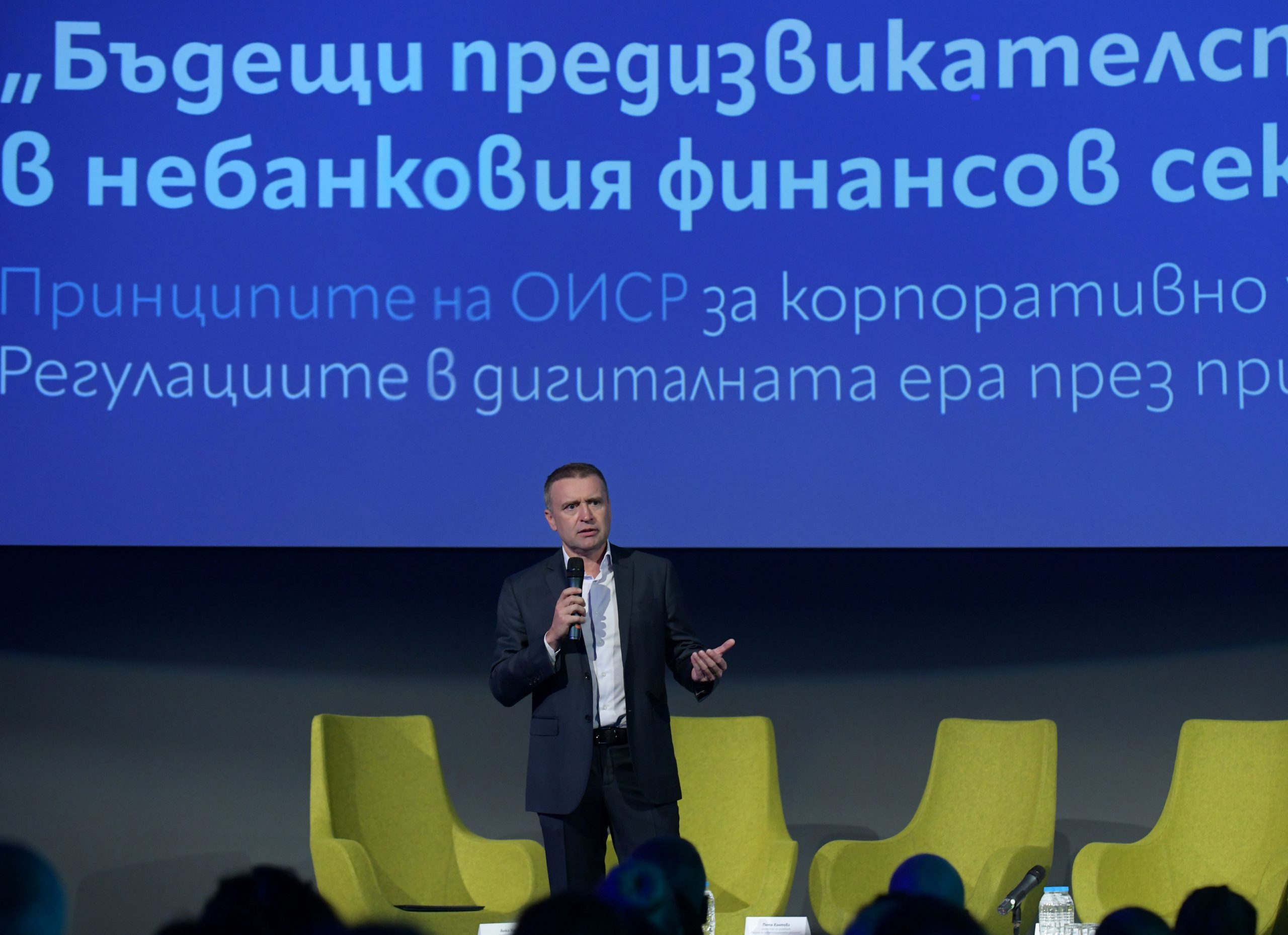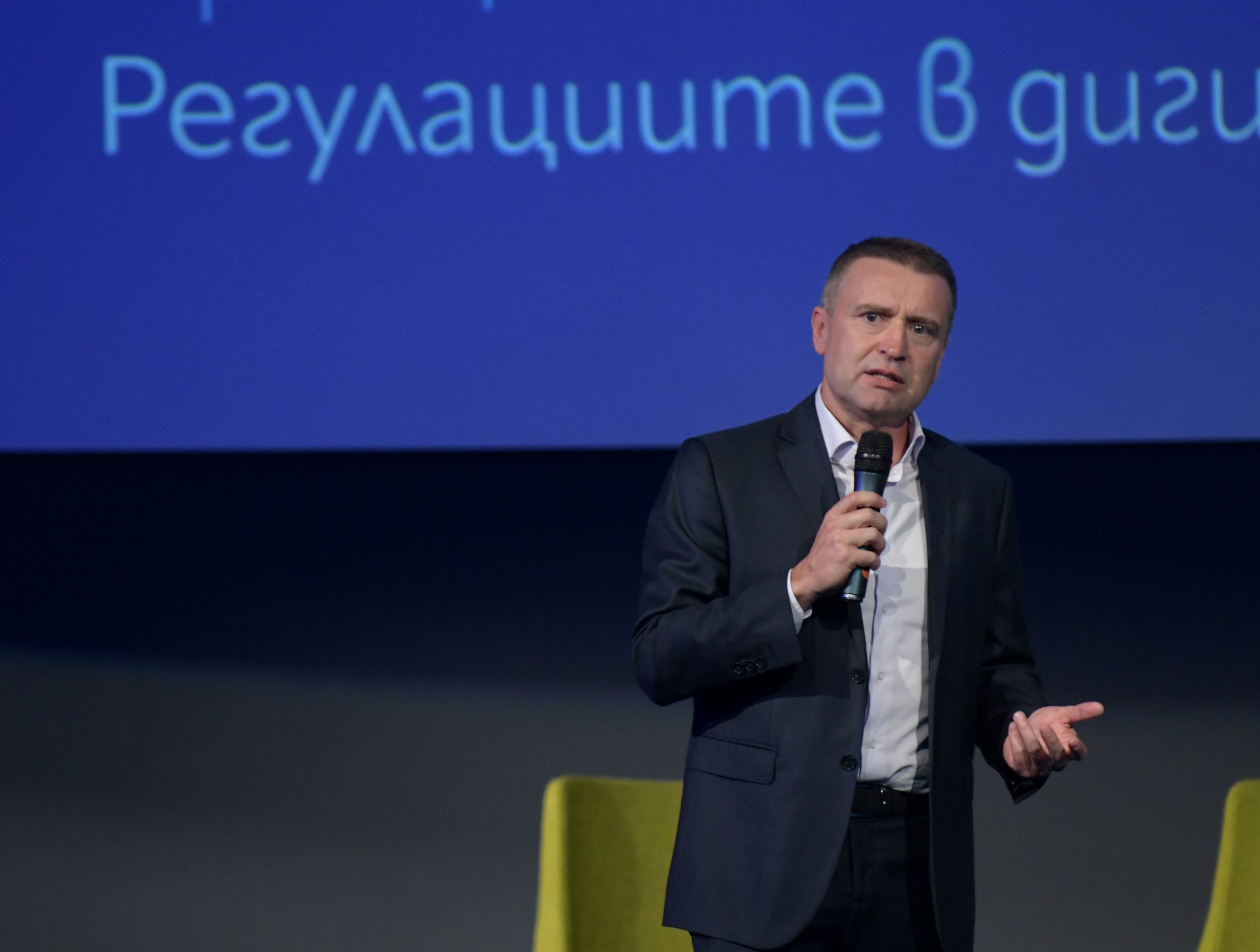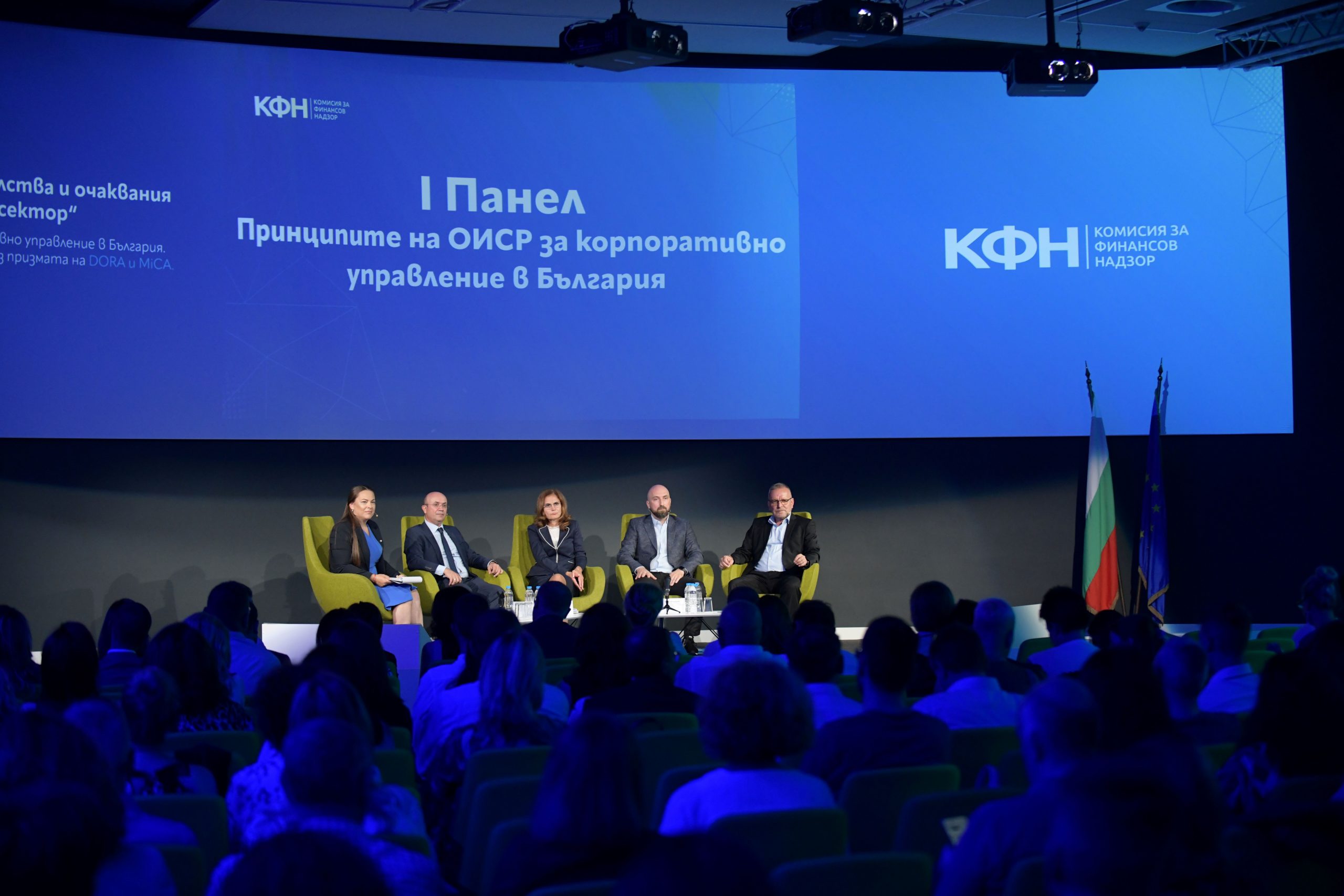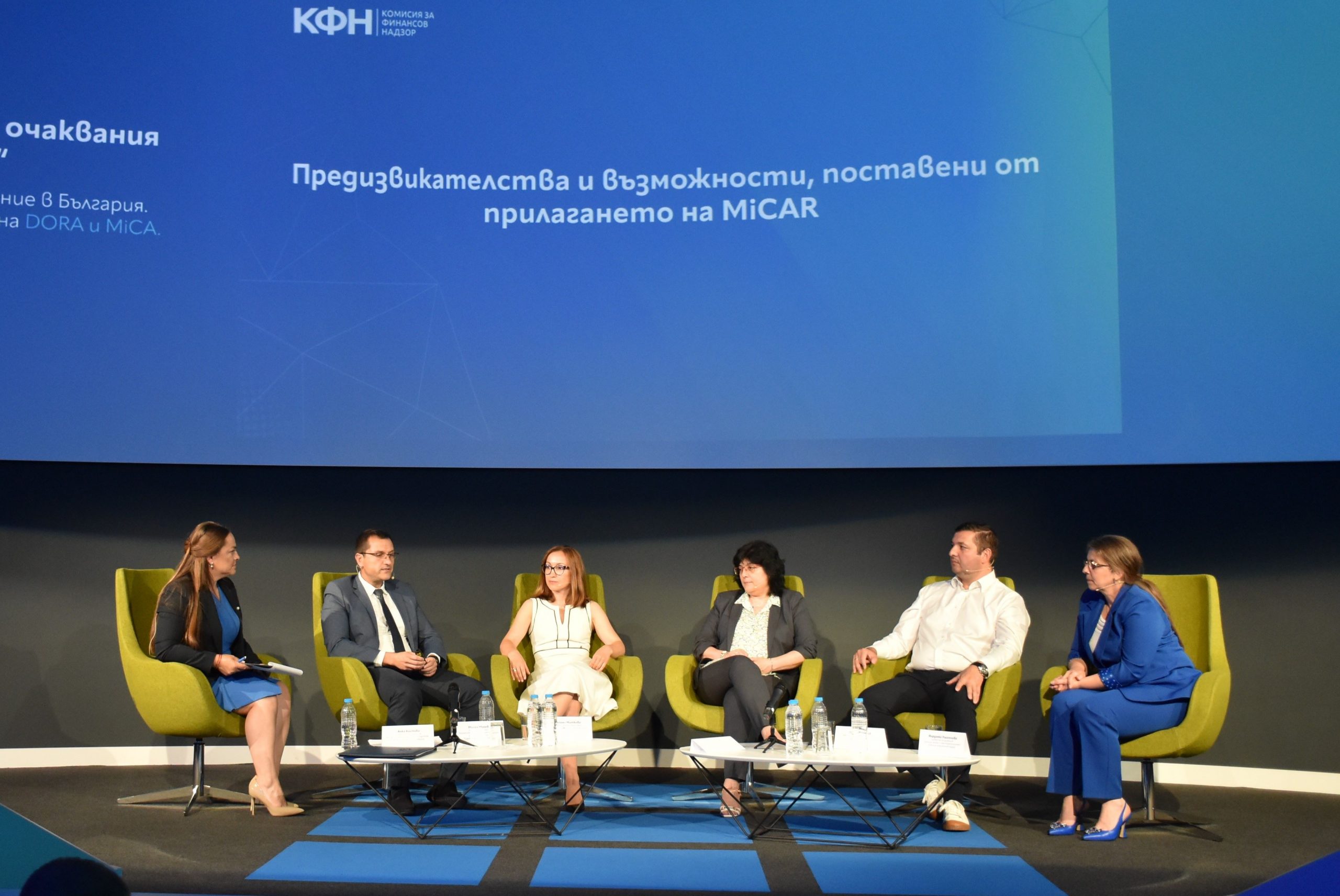On July 10, the Financial Supervision Commission (FSC, the Commission) organized and held the extremely important for the non-banking financial sector conference “Future challenges and expectations in the non-banking financial sector”. At the Inter Expo Center in Sofia, over 300 participants, representatives of the investment, insurance and occupational pensions sectors took part in discussions, panels and presentations dedicated to the OECD principles of corporate governance in Bulgaria and the pan-European regulations – Regulation on the operational sustainability of digital technologies in the financial sector (DORA – Digital Operational Resilience Act) and the regulation on markets in crypto-assets (MiCA – Markets in Crypto-Assets).
Mr. Boyko Atanasov opened the conference with answers to the questions why the business and the regulator in the face of the FSC have a high-priority need for dialogue on the topic of new regulations in the non-banking financial sector. He shared with the participants that “The conference is a strategic initiative of the Financial Supervision Commission to promote a well-informed, collaborative and sustainable environment at the time of implementation of the two regulations, on which the future of digital finance will depend. It is our job to ensure that stakeholders are prepared to deal with the complexities of modern non-banking financial sector regulations and corporate governance.”

The audience of the live conference exceeded 300 participants – professionals and experts from the FSC, supervised entities – investment funds and intermediaries, insurance companies, occupational pensions companies, institutional partners, representatives of the business, the state, investors, consultants and the media. The FSC Chair and the moderator of the event encouraged an in-depth dialogue to identify solutions for specific cases, to share good practices and to develop strategies to effectively deal with the innovations faced by the non-banking financial sector in the country.
Boyko Atanasov also commented: “I believe that by proactively working and by sharing basic guidelines, we will facilitate the implementation of the principles and regulations regarding crypto–asset markets, we will help create a transparent and reliable financial system that benefits all interested parties. We will likely have challenges that we will overcome together and seek solutions to protect consumers. In a global and highly interconnected world, we must trust each other. Trust to overcome barriers and create a shared understanding of good corporate governance, promoting social responsibility and building a stable, sustainable and competitive economy.”

The conference was held in two main parts, with the first highlighting the OECD principles of corporate governance and regulatory compliance with a focus on sustainability, responsible investing and key ESG indicators for ethical impact assessment, and the second highlighting the challenges and core requirements of DORA and MiCA.
In addition to the FSC experts, who presented the OECD principles of corporate governance and the regulatory requirements of the two regulations, the event’s guest speakers and panelists were: Biserka Radeva – Director of the Network and Information Security Directorate at the Ministry of Electronic Government, Assoc. Prof., PhD, Mr. Manyu Moravenov – Member of the Board of Directors and Executive Director of the Bulgarian Stock Exchange, Kosta Yordanov – Executive Director and Deputy Chair of the Board of Directors of “Bianor Holding” AD, Stanislav Tanushev – Director of Investor Relations and Sustainability of “Sirma Group Holding” AD, Petko Petkov – Senior Manager of Consulting at Deloitte Bulgaria and Adelina Mitkova – Senior Manager at law firm Deloitte Legal.
The conference affected two regulations on which the future of digital finance will depend. Experts commented on the opportunities and challenges of DORA and MiCA, focusing on addressing growing cyber security threats and ensuring the stability of the financial system.
The principles of corporate governance will be a benchmark for Bulgarian companies that strive to align themselves with the best global practices, thus promoting a sustainable financial environment. This thesis was also the basis of the discussions on the introduction of the Code of Corporate Governance, which will set the standard for ethics, transparency and accountability, with the panelists also emphasizing the importance of corporate governance frameworks, their role in increasing investor confidence and ensuring sustainable growth.
Assoc. Prof. PhD. Manyu Moravenov pointed out that “corporate governance is the basis of the new business morality and the way companies should communicate with the public”. He noted that the latest amendments to the OECD principles are related to ESG policies and standards, and the ESG rating itself, which the Bulgarian Stock Exchange offers as a service through its partner LSEG Analytics, which is formed on the basis of a methodology in which more than 700 ESGs indicators are used, and 186 of them are comparable. He called upon public companies to obtain their ESG rating, and detailed information on the process which can be found on the Exchange’s page.
Assoc. Prof. PhD. Manyu Moravenov recommended that listed companies use the OXYGEN platform for reporting non-financial information – environmental, social and corporate aspects of the companies’ activities.
Ms. Petya Hantova – Director of the “Investments Supervision” Directorate, FSC, drew attention to the role of the regulator in the application of corporate governance principles, the legal framework and their main characteristics. Ms. Hantova pointed out that corporate governance includes a set of relationships between the company’s management, the board of directors, shareholders and stakeholders, and that each company should read the principles and implement them in the best way. Ms. Hantova also emphasized that the joint efforts of the regulator and capital market participants are the basis of ensuring its stability and transparency in building trust in investors, which in turn is a prerequisite for its development. She also noted that on a global scale, as well as in Bulgaria, the trend is becoming more and more prevalent, in which, when presenting a financial statement, investors are not so much interested in the figures inside, but in what is behind them – in the declaration of corporate governance to the non-financial information that is part of the reporting process.
The next panelist – Kosta Yordanov – Executive Director and Deputy Chair of the Board of Directors of “Bianor Holding” AD, drew attention to the fact that for the development of corporate governance in a company, steps must be taken to improve the work at the management level, as well as to increase investor confidence in the organization through open communication with them.
Stanislav Tanushev – Director of Investor Relations and Sustainability of “Sirma Group Holding” AD indicated that despite the numerous challenges in complying with the OECD Principles, they also provide many opportunities for direct positive results. He illustrates this with examples from “Sirma Group Holding” AD, where the care for nature and sustainability, and the installation of a photovoltaic plant of the company, also brings a direct financial result. Furthermore, how caring for employees leads to their job satisfaction and reduced turnover. Similar examples can be given for each of the Principles.

Mrs. Yordanka Ushagelova – Director of “Analysis, Complaints and Restructuring” Directorate at the FSC drew attention to the challenges in introducing the Digital Operational Resilience Act. She pointed out that the purpose of the regulation is to introduce a comprehensive framework for digital operational resilience of EU financial entities. Ms. Ushagelova elaborated on the scope and significance of DORA.
Petko Petkov – Senior Manager “Consulting” at “Deloitte Bulgaria” explained that the Digital Operational Resilience Act “is not a revolution, but an evolution of already established norms”, which should introduce stricter requirements regarding cyber security . The panelist pointed out that there is an emerging drive for a coordinated approach in managing the risk arising from the use of digital technologies.
Biserka Radeva – Director of “Network and Information Security” Directorate in the Ministry of e-Government summarized the development over the years of the Law on Cyber Security and pointed out that at the moment there is a Law on Amendments and Supplements to the Law on Cyber Security based on the Directive (EU ) 2022/2555 of the European Parliament and of the Council of 14 December 2022 on measures for a high common level of cybersecurity across the Union, amending Regulation (EU) No 910/2014 and Directive (EU) 2018/1972, and repealing Directive (EU) 2016/1148 (NIS 2 Directive). Ms. Radeva pointed out the main pillars of NIS 2 – Member States’ responsibility, risk management and cooperation and information exchange. She also listed the similarities and differences between DORA and NIS2.
Adelina Mitkova – Senior Manager at Deloitte Legal law firm talks about the regulation on markets in crypto assets. She pointed out that this regulation is a “revolution rather than an evolution” and that it regulates the issuance, public offering and admission to trading of crypto-assets not covered by existing European legislation, as well as the conditions under which the services related to crypto-assets can be provided. Ms. Mitkova indicated which crypto-assets fall within the scope of the regulation, namely: asset-backed tokens, e-money tokens and all other consumer tokens. Mrs. Mitkova also noted what the main requirements are for the public offering of tokens. She concluded that MiCA will provide legal certainty to the crypto-asset market.
Mr. Milen Milev – Head of the “Regulation and Methodology” Department, Legal Directorate, FSC, spoke about the legal framework regarding the draft Law on Crypto Asset Markets and the measures that the Republic of Bulgaria will have to implement. He explicitly indicated that the Financial Supervision Commission was not unequivocally designated as the competent authority for the implementation of MiCA. He also indicated which persons fall within the scope of MiCA, namely the persons under Art. 4, items 38 and 39 of the Law on Measures Against Money Laundering.
The panelists agreed that the new regulations and their enforcement will increase investor confidence and contribute to increased security in the fight against money laundering and terrorist financing.

The Financial Supervision Commission will continue to take a proactive approach to the implementation and oversight of European regulations, which are critical to addressing the complexities of digital transformation and maintaining capital market integrity. The non-banking financial sector and its development will rely on adherence to the principles of corporate governance and regulatory compliance – paramount to driving innovation, maintaining stability, effective governance and implementing regulatory best practices.
Below you can download the presentations presented during the Conference.